Supreme Court skeptical of case to restrict abortion pill mifepristone: Live updates
- Oops!Something went wrong.Please try again later.
- Oops!Something went wrong.Please try again later.
- Oops!Something went wrong.Please try again later.
WASHINGTON − Supreme Court justices on Tuesday sounded skeptical that anti-abortion doctors have the ability to challenge the Food and Drug Administration’s rules for a common abortion drug, raising the possibility that the court could dismiss a case that threatened to sharply limit access to mifepristone.
Justices on both sides of the court's ideological divide pressed lawyers for anti-abortion doctors for evidence that physicians had been forced to violate their conscience by treating a patient suffering from mifepristone side effects, and they questioned the nationwide sweep of lower court orders restricting use of the drug.
Justice Neil Gorsuch said the case “seems like a prime example of turning what could be a small lawsuit into a nationwide legislative assembly on an FDA rule or any other federal government action.”
Two years after overturning Roe v. Wade, the justices were asked to consider whether to rollback FDA decisions loosening restrictions on how mifepristone can be prescribed and dispensed. The drug was used in nearly two-thirds of U.S. abortions last year.
More: What does the mifepristone case mean for Plan B? The difference between the two explained.

The doctors challenging the drug said the FDA didn’t follow its own protocols and ignored contrary data when, in 2016 and 2020, it loosened the rules on who can prescribe mifepristone and how it can be dispensed. They said the FDA's changes created a “substantial risk” they would be forced treat women suffering emergency complications from the drug, which would violate their personal ethics.
Much of the nearly two hours of oral arguments focused on that issue, rather than on whether the FDA properly relaxed restrictions after the drug had been available for more than two decades.
The court's decision, expected by the end of June, will land smack in the middle of an election year.
Follow along for live updates.
'Callous disregard versus an 'extensive body of evidence'
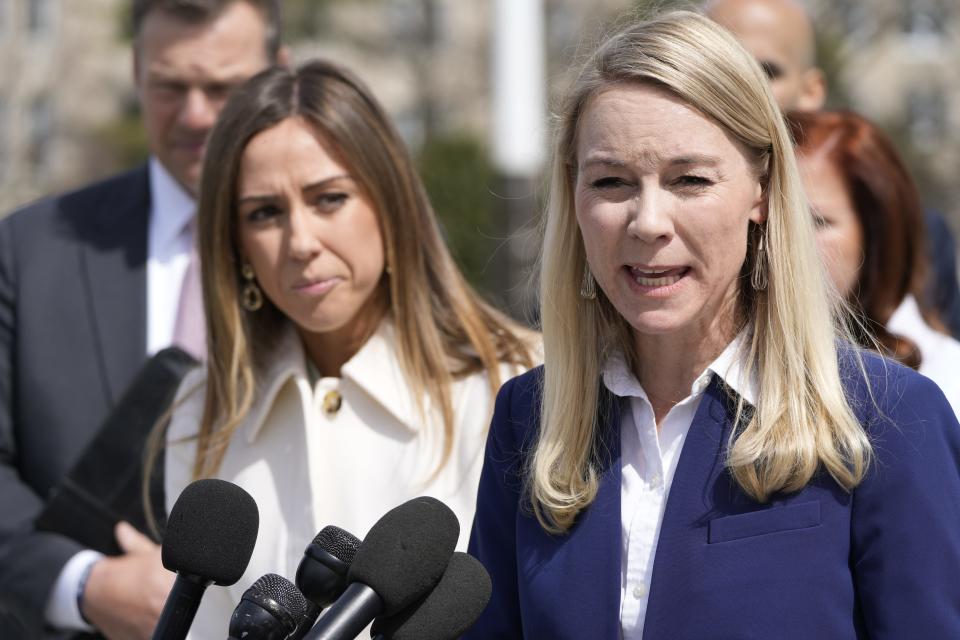
Speaking to reporters from the steps of the Supreme Court, Erin Hawley, representing the anti-abortion doctors behind the case, addressed what she called the FDA’s “callous disregard” by approving the postal delivery of mifepristone to patients.
“Women deserve better,” Hawley said, adding that regardless of one’s position, “we should all agree women’s health matters.”
Jessica Ellsworth, a lawyer for Danco Laboratories, makers of mifepristone, argued that because the doctors had not been harmed by the abortion drug, and that they had failed to prove they have standing to sue.
“The fact is they don’t,” Ellsworth said.
Ellsworth added that the FDA had approved mifepristone decades ago with “extensive body of evidence and well within its authority and in accordance with the law.”
--Savannah Kuchar
More: How the Supreme Court case on the abortion drug mifepristone could affect 2024 election
Justices question sweep of lower court judgements
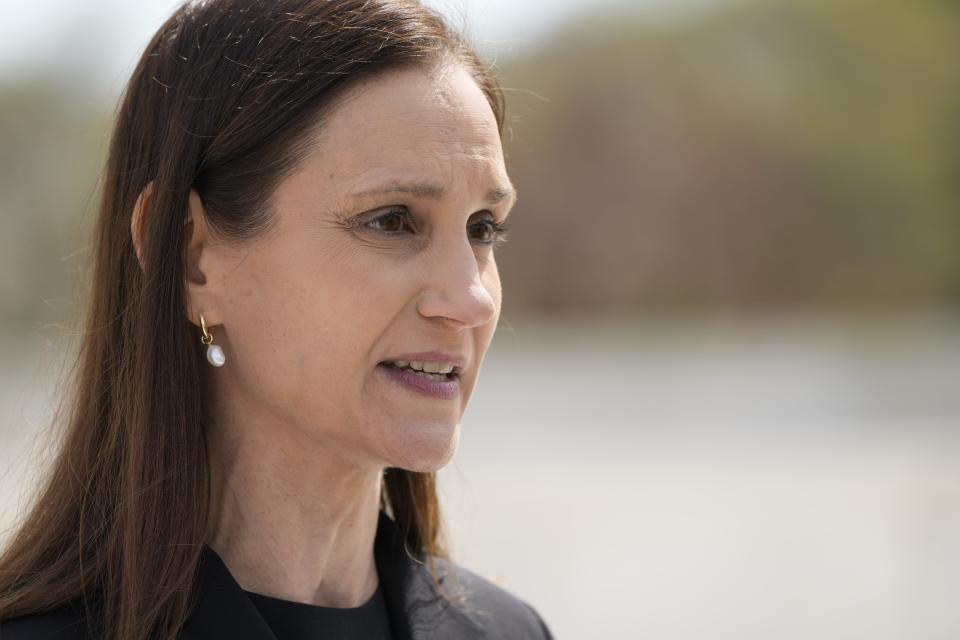
Justices Amy Coney Barrett, Brett Kavanaugh and Neil Gorsuch − all appointees of former President Donald Trump − probed whether the doctors’ objections to medication abortions could be solved by anti-abortion doctors asserting a conscience objection to certain treatments, rather than a sweeping judgment affecting nationwide access.
“We say over and over again: Provide a remedy sufficient to address the plaintiff’s asserted injuries and go no further,” Gorsuch said. “We have before us a handful of doctors who have asserted a conscience objection.”
Erin M. Hawley, the attorney for the anti-abortion doctors, said the existing conscience objection is not good enough because doctors may not have time in an emergency situation to raise one.
But justices repeatedly asked for evidence that any doctor had ever been in those circumstances.
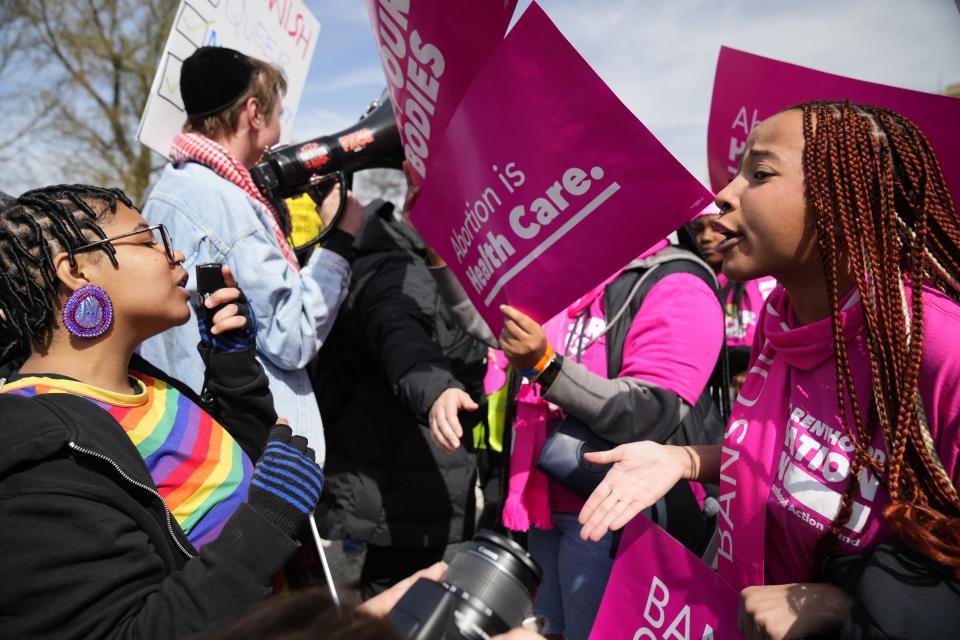
“Can you point me to any place in the declarations where a declarant states that they attempted to object, but were unable to?” asked Justice Ketanji Brown Jackson.
Hawley replied that she couldn't provide evidence because doctors don't always know the events that preceded an emergency before they reach the emergency room.
Chief Justice John Roberts asked why the case couldn’t be limited to the people involved in one region, rather than blocking the FDA from allowing the drug everywhere.
“I think it might be impracticable,” Hawley said, because the FDA regulation would remain in place “and permit things like mail-order abortions.”
More: Welcome to Bristol, where America’s abortion debate is right on your doorstep
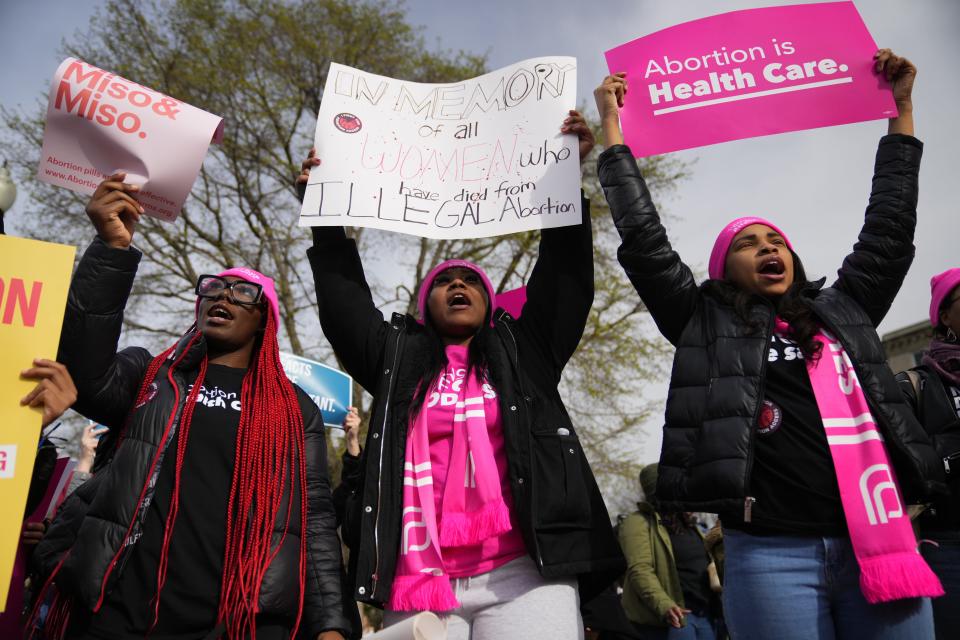
'Profound mismatch': Biden administration lawyer decries sweeping abortion ruling
Solicitor General Elizabeth Prelogar closed her argument by denouncing what she called a “profound mismatch” between the remote harm the FDA opponents say they have suffered or could suffer, and the sweeping ruling from a lower court to restrict access to mifepristone.
“What is so telling,” Prelogar told the justices, is that FDA opponents can’t point to a single specific doctor who has ever had to violate their conscience by providing care to a woman suffering a serious health issue as a result of taking mifepristone under the FDA’s regulations.
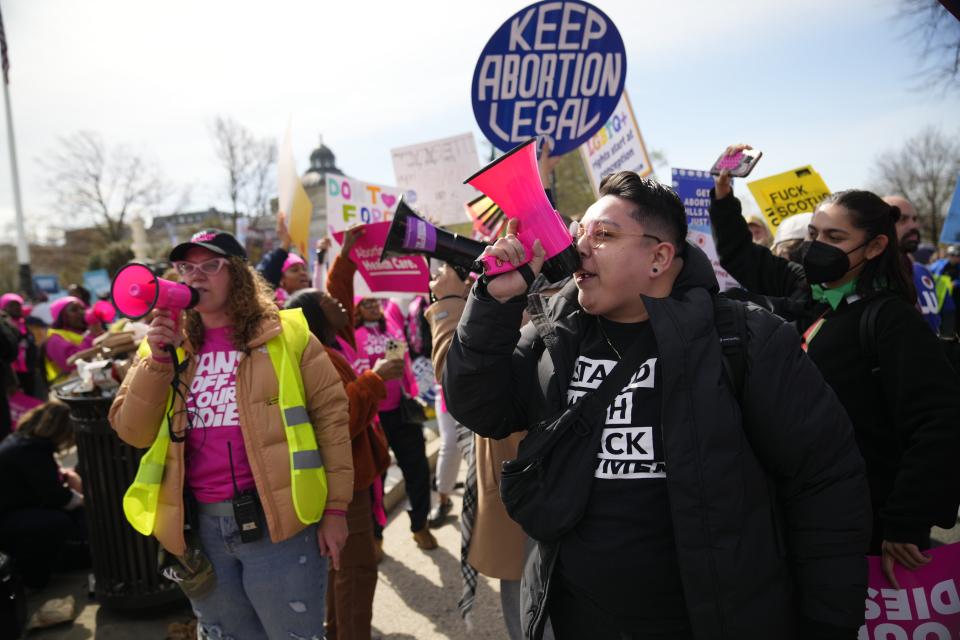
It’s worth stepping back and thinking about “the profound mismatch” between the opponents’ theory of the injury that gives them the ability to sue − and the remedy they got from the lower court, Prelogar said.
What the lower court did to guard against the very remote risk to the FDA’s opponents is issue a sweeping, nationwide ruling that “restricts access to mifepristone for every single woman in this country," Prelogar said.
--Aysha Bagchi
More: VP Kamala Harris broke politics at an abortion clinic visit. She even said the 'u' word
The Supreme Court has considered mifepristone before
This isn’t the first time mifepristone has become before the Supreme Court.
In April 2023, the court in an emergency ruling allowed full access to the drug while the underlying lawsuit continues. That happened over the objections of Justices Clarence Thomas and Samuel Alito, who would have allowed the rollback sought by anti-abortion groups to take effect.
In January 2021, the court sided 6-3 with the outgoing Trump administration in requiring women visit in person a doctor’s office, hospital or clinic to receive mifepristone.
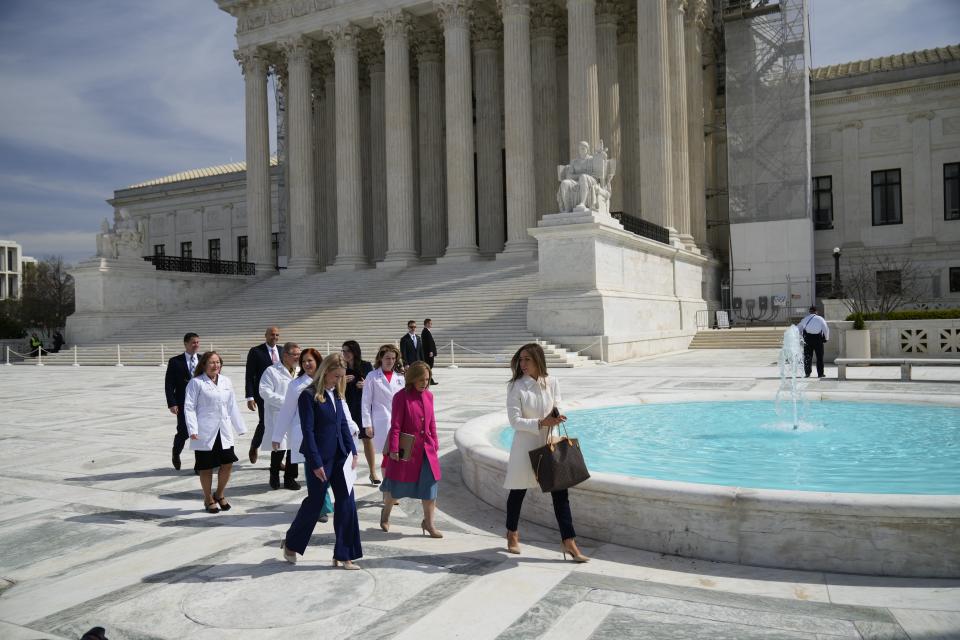
That requirement had been challenged by the American College of Obstetricians and Gynecologists and other groups. Because of the risk of going to medical facilities during the pandemic, the administration had suspended similar requirements for other drugs, but not for mifepristone.
Months after President Joe Biden took office, the FDA said it would not enforce the in-person requirement.
--Maureen Groppe
More SCOTUS: 'Cancel culture': Supreme Court rejects case on dust-up between Catholic student and Native American
Studies used to attack mifepristone have been retracted
Two of the three studies a Texas federal judge cited in ruling last year that the FDA ignored the safety risks of mifepristone have been retracted by the medical journal that published them.
The publisher said a post-publication peer review found problems with the study design, methodology and data analysis.
The studies’ lead author called the retraction a “baseless attack.”
--Maureen Groppe
More SCOTUS: Supreme Court lets stand a ban against Cowboys for Trump co-founder using 14th Amendment
Rabbi says abortion access is a Jewish value
Amelia Wolf, a 32-year-old rabbi from Arlington, Virginia, traveled to the Supreme Court on Tuesday morning to advocate for the protection of what she sees as an important Jewish value.
“Our religious tradition mandates that, in many cases, abortion is very important for the life, health, and well-being of a pregnant person,” she said. “I am concerned that there's only one religious voice that gets the most hearing on this subject, and I want to offer another one.”
Wolf, who moved to the area recently, was alerted to demonstrations planned at the nation’s highest court by a call from the National Council for Jewish Women.
Wolf said she fears the effects of a ruling that further restricts abortion access. “I know that many people of different genders need abortions, but I think this is being used as a tool to control women's bodies, and that really frightens me,” she said.
“If it's overwhelmingly a women's issue, then I think they should listen to the overwhelming majority of women in this country.”
--Cybele Mayes-Osterman
More SCOTUS: Supreme Court says Trump White House official Peter Navarro must begin prison sentence
Doctors opposed to mifepristone contend risks of ER visits rises with online prescriptions
Justices Elena Kagan and Amy Coney Barrett asked how the Food and Drug Administration’s change in 2021, when the agency warned that without in-person visits to get a prescription for mifepristone, medical care such as emergency room visits or surgery are likely to increase.
Erin Hawley, representing doctors opposed to mifepristone, said in-person visits are the best way to examine a woman for an ectopic pregnancy or to gauge the gestational age of the fetus. She said the FDA’s current policy allows prescribing mifepristone online with a couple of screening questions.
“I don’t think that’s nearly as good as an in-person exam,” Hawley said.
But Barrett cited the government’s lawyer, Solicitor General Elizabeth Prelogar, saying the initial doctor’s visit doesn’t require an ultrasound or a test to detect a fetal heartbeat, so it wouldn’t necessarily reveal an ectopic pregnancy or fetal heartbeat.
Hawley cited FDA statistics showing the risk of ER visits nearly tripled from 2.1% with an in-person visit to 5.8% without.
“These are the same surgical interventions that harm” doctors who brought the lawsuit, Hawley said.
--Bart Jansen
Drug industry warns of dire consequences
Danco Laboratories, the maker of mifepristone, joined the federal government in fighting the challenge to the drug, with the pharmaceutical industry standing behind it.
PhRMA., the major trade group for drug companies, told the court the case threatens to “jeopardize the settled regulatory framework that facilitates the development of life-saving medicines.”
If the lower court’s ruling is upheld, PhRMA told the court, every drug approval could face a substantial risk of litigation, making the process more expensive − reducing drug makers’ incentive to produce new medicines.
The group called the FDA’s science-based evaluations the “bedrock” of the nation’s drug approval process.
If the Supreme Court agrees with the challengers that the FDA’s process was flawed, it would be an exceptional break from the deference federal courts traditionally give the FDA, according to Steven Schwinn, a professor at the University of Illinois Chicago School of Law, who previewed the case for the American Bar Association.
--Maureen Groppe
Thomas questions one basis for suing FDA
Justice Clarence Thomas questioned one argument brought by the mifepristone opponents for how they are injured and therefore have standing to sue. The argument is that an organization that is suing can be injured because it had to divert resources as a result of the FDA’s actions.
“Isn’t that just the cost of pursuing litigation?” Thomas asked Erin Hawley, who represents the doctors and groups challenging the FDA’s decisions.
Thomas suggested that allowing a plaintiff to sue in such circumstances could widen the door to more lawsuits than the courts currently allow.
“That would be anyone who is aggressive or vigilant about bringing lawsuits, just simply by using resources to advocate their position in court — you say now — causes an injury. That seems easily, easy to manufacture,” Thomas said.
“I don't think that's true in this case, Justice Thomas,” Hawley responded.
Hawley said FDA opponents did significant work that wasn’t related to litigation and wasn’t a prelude to litigation, including combing through data and thinking about the true nature of adverse events as a result of the FDA’s decisions.
--Aysha Bagchi
Justices question district courts making decisions for entire country
Chief Justice John Roberts and Justice Neil Gorsuch raised concerns, as they have in other cases, about district courts issuing judgments that cover the entire country, as happened in the mifepristone case, rather than just their own geographic jurisdictions.
Roberts asked why the case couldn’t be limited to the people involved in one region, rather than blocking the FDA from allowing the drug everywhere.
“I think it might be impracticable,” Hawley said, because the FDA regulation would remain in place “and permit things like mail-order abortions.”
Gorsuch said there zero nationwide injunctions during the 12 years of Franklin Delano Roosevelt’s administration compared to 60 in about the last four years.
“They’re a relatively new thing,” Gorsuch said. “You’re asking us to extend and pursue this relatively new remedial course, which this court has never adopted itself. Lower courts have kind of run with this.”
Hawley argued that nationwide remedies are often needed to so that everyone is treated the same. She argued it wouldn’t be equitable to have some people denied the medication while the FDA allowed it for others.
“That’s inconsistent with equity,” Hawley said.
--Bart Jansen
Are conscience protections enough?
Erin M. Hawley, the attorney for the anti-abortion doctors challenging mifepristone, was pressed on why the doctors can’t avoid the drug by raising a conscience objection.
Justice Ketanjj Brown Jackson said that exemption already exists, but the doctors are now trying to prevent others from gaining access to medication abortion. Why isn’t that an overly broad remedy, she asked.
Hawley said doctors can’t always raise a conscience objection because they may not know until they scrub in for an emergency whether the situation is a miscarriage, an ectopic pregnancy or an elective abortion.
“These are life-threatening situations,” she said.
Justice Elena Kagan asserted that most hospitals have mechanisms to ensure that doctors can assert conscience protections.
--Maureen Groppe
Alito questions company’s profit motive in trying to avoid restrictions on mifepristone
Because Justice Samuel Alito asked whether Danco Laboratories, the company that manufactures mifepristone, aimed to make more money if the court’s restriction on the FDA were lifted. He also asked whether the FDA has ever pulled a drug because of adverse results on patients.
“You will be harmed because you’re going to sell more,” Alito said. “Do you think the FDA is infallible?”
Jessica Ellsworth, a lawyer for Danco, said drugs have certainly been withdrawn after approval, which is why manufacturers keep tracking reactions to their products. She said the FDA stopped asking the company to report non-fatal consequence to the drug in 2016, based on 15 years of “a well-established safety profile.”
“You don’t want to sell a product that causes very serious harm to the people who take your product,” Alito said. “Wouldn’t you want that data?”
Ellsworth said the company tracks safety data, with an 800-number on its website and on the drug’s labeling. Ellsworth said Danco is still subject to lawsuits over allegations such as failing to warn about risks of the drug or deceptive advertising.
Ellsworth argued that the arguments in this case were “revolutionary” because people who don’t use the product or prescribe it are trying “to prevent anyone else from using it in line with FDA’s considered scientific judgment.”
--Bart Jansen
How do I watch Supreme Court oral arguments?
Don't expect to see any Supreme Court justices on camera today. You can't watch the proceedings in the Supreme Court, but you can listen to live arguments here.
– Marina Pitofsky
Who is Jessica Ellsworth?
Jessica Ellsworth is an attorney for Danco Laboratories, the maker of mifepristone. She's joining Solicitor General Elizabeth Prelogar is representing the FDA as the court looks into the medication widely referred to as the abortion pill.
– Marina Pitofsky and Maureen Groppe
What is the solicitor general?
The solicitor general is the main lawyer who represents the federal government before the Supreme Court. The solicitor general is sometimes called the "10th justice" on the court, and they lead a team of attorneys who can argue before the court on behalf of the nation's government.
They may also choose whether to appeal lower court rulings if the government is involved in a lawsuit.
– Marina Pitofsky
Who is Elizabeth Prelogar?
Elizabeth Prelogar is the Solicitor General of the United States. She's answering questions and making arguments today before the Supreme Court in the pivotal case surrounding the FDA's handling of the abortion pill.
But what does the solicitor general do? It's a wide-reaching role, but in general, the Department of Justice explains that they determine "the cases in which Supreme Court review will be sought by the government and the positions the government will take before the Court."
– Marina Pitofsky
Conservative justices bring up Comstock Act
Two of the court’s most conservative justices – Samuel Alito and Clarence Thomas – raised the issue of whether a 19th-century obscenity law prevents mifepristone from being dispensed through the mail.
Both Solicitor General Elizabeth Prelogar and Jessica Ellsworth, the attorney representing the manufacturer, said the FDA wasn’t required to consider that law.
Ellsworth said the court should think hard about the mischief it would invite if it allows agencies to take action based on statutory authority that Congress assigned to other agencies.
Ellsworth also noted that Comstock Act hasn’t been enforced for nearly 100 years. This case, she said, isn’t an opportunity for the court to opine on it.
Some abortion opponents are promoting the Comstock Act as a de facto federal abortion ban that just needs enforcing.
Erin M. Hawley, the attorney for the anti-abortion doctors challenging mifepristone, said the FDA can’t ignore federal law.
--Maureen Groppe
‘What the people want’: Abortion rights protestor, father among crowd
Ronald Quirk, 65, came to the Supreme Court Tuesday from nearby Arlington, Virginia with a sign reading “Supreme Tyranny.” The father of a 24-year-old daughter, Quirk said he was protesting because he feels the justices have made women “second class citizens” by overturning Roe v. Wade and considering today’s case.“No U.S. citizen should have rights taken away and that’s what, they did it last year with Dobbs and now they’re trying to do it again. And where’s it going to stop?” Quirk said.Quirk noted that voters in deep red states, including Ohio, have passed state constitutional amendments to enshrine abortion access.“This is what the people want,” he said.
— Savannah Kuchar
Getting rid of in-person dispensing requirement
Justice Amy Coney Barrett asked government lawyer Elizabeth Prelogar about the FDA’s decision to get rid of a requirement for patients to have an in-person meeting in order to be given mifepristone. The FDA got rid of that requirement in 2021, in part based on experiences during the COVID-19 pandemic.
Barrett said it seemed to her, in looking at the data, that the elimination of the in-person visit at the outset would lead to mistakes in gestational aging, which could increase the risks of the medication, including when it comes to the amount of bleeding.
Prelogar said she believed Barrett was operating on a mistaken premise that getting rid of the in-person requirement would necessarily increase the risk of such events. An ultrasound was never required, Prelogar said, and while there has been an increase in emergency room visits, that didn’t correlate with an actual increase in serious adverse events.
--Aysha Bagchi
Case marks first time federal courts blocked access to FDA-approved drug: DOJ
Justice Elena Kagan called the government’s argument an “arresting statement” that the case marked the first time federal courts have blocked the use of a drug approved by the Food and Drug Administration.
“To the government’s knowledge, this case marks the first time – and I’m going to say, ‘Is it the first time, is it the only time?’ – any court has restricted access to an FDA approved drug by second-guessing FDA’s expert judgment about the conditions required to assure that drug’s safe use,” Kagan read from the government’s written argument. “Is it still the only time?”
Solicitor General Elizabeth Prelogar said it was still true. She argued the courts have no business second-guessing FDA experts about which drugs are safe.
“That is still to our knowledge the only time a court has done that,” Prelogar said. “We have seen a disturbing trend of courts sometimes also overriding FDA’s judgment to grant greater access to drugs.”
--Bart Jansen
Reasons for increase in ER visits probed
Questioned about an increase in emergency room visits after mifepristone was allowed to be dispensed through the mail, Solicitor General Elizabeth Prelogar said that increase wasn’t because of a troublesome uptick in complications. Many women might go to the ER because they have questions about heavy bleeding, for example, but didn’t need treatment.
In one study, she said, half of the women who went didn’t get any treatment.
Justice Sonya Sotomayor tried to drive that message home. Whatever the statistical increase in ER visits, she asked, the FDA determined the data didn’t show a significant increase in risk?
Prelogar said that’s correct.
--Maureen Groppe
What is the Comstock Act?
The first judge to hear this case said a 19th-century obscenity law called the Comstock Act prevents the mailing of abortion drugs.
The long-dormant law prohibits mailing "lewd or lascivious" material, as well as anything that could be used to cause an abortion.
While the appeals court did not rely on that law in ruling that the FDA went too far, anti-abortion advocates have raised it in their filings to the Supreme Court.
Any decision by the court that revives the Comstock Act could pave the way toward a national abortion ban.
--Maureen Groppe
How did the abortion pill case wind up at the Supreme Court?
Last April, U.S. District Judge Matthew Kacsmaryk in Texas effectively invalidated the FDA's 23-year-old approval for the drug.
After the Biden administration and the manufacturer appealed that decision, the New Orleans-based 5th U.S. Circuit Court of Appeals panel waved off part of the lawsuit that challenged the FDA's underlying approval of the drug, ruling that it was likely barred by the statute of limitations.
But the three-judge panel affirmed Kacsmaryk's ruling that the FDA was wrong for approving changes in 2016 and 2021 that let women take the drug three weeks longer into a pregnancy and allowed the drugs to be dispensed through the mail without in-person visits with a doctor.
“In loosening mifepristone’s safety restrictions, FDA failed to address several important concerns about whether the drug would be safe for the women who use it," the court wrote. “It failed to gather evidence that affirmatively showed that mifepristone could be used safely without being prescribed and dispensed in person."
The case marks the first time a court has restricted access to an FDA-approved drug by second-guessing the agency’s expert judgement, according to the Biden administration.
--Maureen Groppe
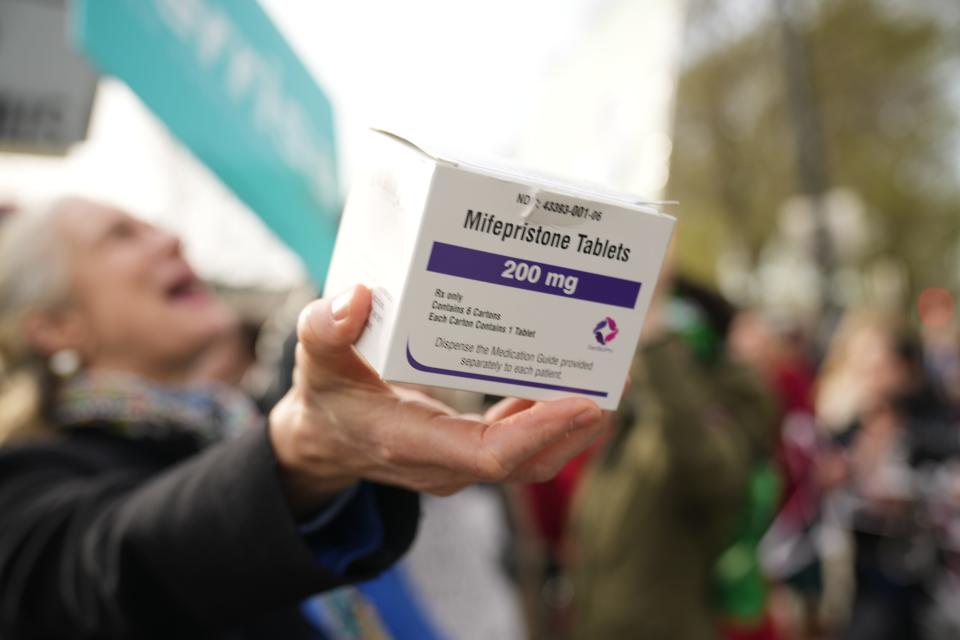
Dividing line: Welcome to Bristol, where America’s abortion debate is right on your doorstep
What is mifepristone? How does mifepristone work in the body?
Mifepristone is one of two drugs used for medication abortion in the United States. The other is misoprostol, which is also used to treat other medical conditions. The pills are taken about two days apart.
Mifepristone blocks a hormone needed for pregnancies to progress. Misoprostol causes the cervix to dilate and the uterus to contract, emptying the embryo.
Originally considered safe for use through seven weeks of a pregnancy, the FDA said in 2016 mifepristone could be used through ten weeks. That’s one of the decisions anti-abortion groups have asked the Supreme Court to rollback.
--Maureen Groppe
More: SCOTUS to hear arguments about mifepristone. The impact could go far beyond abortion, experts say
Who can sue FDA over mifepristone?
The first question out of the gate cut to the heart of the government’s argument against the case: Justice Clarence Thomas asked who is eligible to sue to block the Food and Drug Administration from allowing the use of mifepristone?
Solicitor General Elizabeth Prelogar argued that two doctors in the case don’t have standing because they don’t prescribe the drug and wouldn’t have to treat the rare women who have an emergency reaction to the drug. She said the doctors rely on a long chain of remote possibilities.
“The court should say so and put an end to this case,” Prelogar said.
But Thomas asked if the justices agreed with her, who could sue?
“If we agree with you on standing, could you give us an example of who would have standing to challenge these FDA regulations?” Thomas asked.
Prelogar said it’s possible a competing drug manufacturer could complain. But she argued the court should block doctors from second-guessing the FDA, so she couldn’t imagine anyone should be allowed to sue just for their opposition to abortion.
“The answer to that is no, but the reason is because those people aren’t regulated in any relevant way under FDA’s decisions here,” Prelogar said.
Chief Justice John Roberts asked how many potential adverse reactions to the drug it would take for her to change her mind or how many doctors who did work in emergency rooms treating the patients.
“It’s hard for me to imagine it could,” Prelogar said.
--Bart Jansen
‘The American people have no remedy’: Alito questions DOJ position
Justice Samuel Alito questioned U.S. Solicitor General Elizabeth Prelogar about whether anyone would have standing to sue to get a judicial ruling on whether what the FDA did was lawful. The Constitution requires that every plaintiff who brings a lawsuit has standing, meaning they have to demonstrate a certain type of injury they have experienced or could experience.
Prelogar said it’s “hard to identify anyone" who would have the proper type of injury to sue over the FDA’s actions in the case on mifepristone, but the Supreme Court has said “time and again” that the Constitution requires standing even if that means no one can sue.
Alito pushed back on her claim, asking Prelogar to imagine if the FDA “flagrantly violated the law” and endangered the health of women. “The American people have no remedy for that,” he said, characterizing her position.
Prelogar said the FDA takes its responsibility to ensure safety very seriously and can make adjustments to its regulations based on its ongoing surveillance.
--Aysha Bagchi
Not the only abortion case before the court
Today’s challenge to mifepristone is not the only abortion case the Supreme Court is deciding this term.
In April, the Supreme Court will review whether federal law requires doctors in emergency rooms to perform abortions when needed to treat an emergency medical condition, even if doing so might violate a state’s abortion restrictions.
In January, the court allowed Idaho to enforce its strict abortion ban in emergency rooms for now, rebuffing a Biden administration effort to ensure additional access to the procedure in red-state hospitals.
--Maureen Groppe
Dig deeper: What is mifepristone? Judge suspends FDA approval of abortion pill
An all-female lineup of lawyers before the court
All three of the lawyers arguing the medication abortion case before the court today are female.
Solicitor General Elizabeth Prelogar is representing the FDA.
She’s joined in the defense by Jessica Ellsworth, an attorney for Danco Laboratories, the maker of mifepristone.
Erin Hawley, senior counsel with Alliance Defending Freedom, is representing the anti-abortion doctors and groups challenging the FDA’s decisions.
Hawley is married to Sen. Josh, Hawley, R-Mo., both of whom clerked for Chief Justice John Roberts.
--Maureen Groppe
Women’s March protestors arrested in front of Court
Capitol police arrested almost a dozen members of the Women’s March protest, including the group’s executive director Rachel O’Leary Carmona, for civil disobedience Tuesday,
The protestors stood on Constitution Ave and First St NE, a block from the Supreme Court, demonstrating in support of abortion rights ahead of the justices hearing oral arguments.— Savannah Kuchar
Conflict escalates between demonstrators outside Supreme Court
Conflict erupted between demonstrators chanting conflicting messages outside the court on Tuesday morning.“Shame on you for what you do,” one protester, holding a sign reading, “Anti-racist, anti-capitalist, anti-fascist, anti-abortion pills” shouted at a pro-choice demonstrator holding white plastic coat hangers stained with red paint.“This girl says I’m an incubator,” said one woman with “Fully Human” written across her stomach, pointing at the woman holding the coat hangers.A group of demonstrators shouting “abortion is healthcare” joined the group, attempting to drown out the opposing crowd.
-- Cybele Mayes-Osterman
Protestor says John Roberts as killing the Constitution; another sign says Brett Kavanaugh is 'sexiest man alive'
The group of anti-abortion doctors who are challenging mifepristone made their case to protestors before arguments began.
“When the FDA decided to roll back recklessly every single safety protocol for women before they got the abortion drug, they didn’t speak to the women who would become the living victims of abortion,” said Chelsey Youman, National Director of Public Policy for a group called the Human Coalitions.
Catherine Glenn Foster, former president and CEO of Americans United for Life, said she had felt alone when she visited an abortion clinic years ago, after she learned she was pregnant as a 19-year-old sophomore at a Christian university.
“As I get ready to go into the courtroom, I have one clear message for you. We are not alone,” she said.
A line of demonstrators wearing white doctors’ coats holding signs reading, “Women deserve safe medical care” and, “FDA: Put Women First” stood close to the stage, cheering for the speakers.As the speeches continued, a line of pro-choice demonstrators filed in front of the group, blocking it off from the street. They held mock magazine covers with pictures of the Supreme Court justices - one depicting Chief Justice John Roberts read, “John Roberts: The Man Who Presided Over the Death of the Constitution,” while another read, “Brett Kavanaugh: Sexist Man Alive.”
-- Cybele Mayes-Osterman
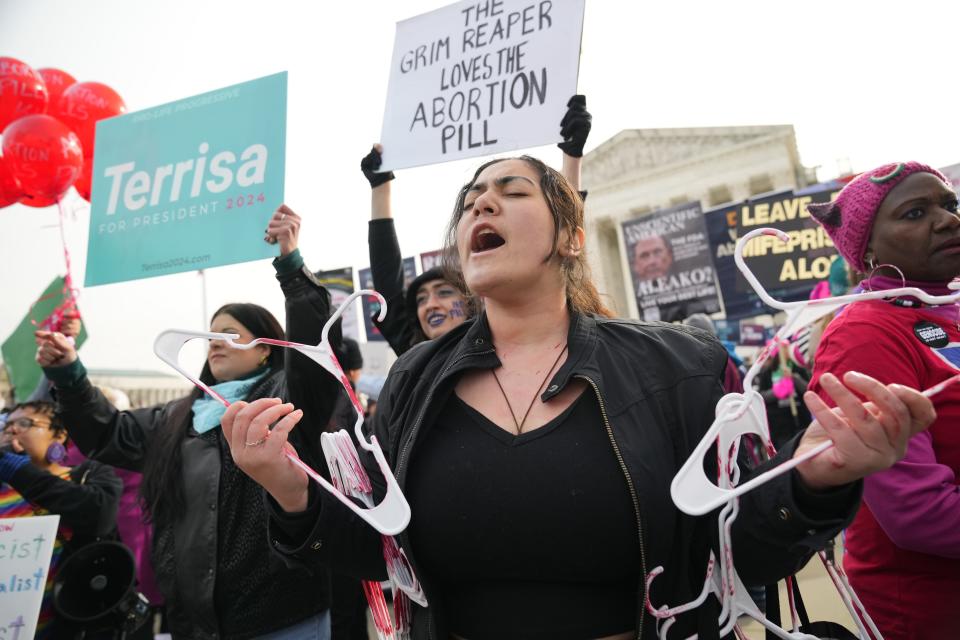
Biden campaign blames Trump for abortion pill challenge before Supreme Court
Ahead of the Supreme Court’s oral arguments, President Joe Biden’s reelection campaign blamed former President Donald Trump for a case that could strip access to abortion pills across the country – and warned he doesn’t want to stop there.
“It would be the biggest step towards Donald Trump's ultimate goal of a nationwide abortion ban since Roe was overturned,” Biden campaign manager Julie Rodriguez Chavez told reporters.
The campaign has worked aggressively to remind Americans that Trump’s three Supreme Court appointments led to the overturning of Roe v. Wade in 2022. More than 20 states have taken action to restrict abortions since the decision.
Trump, the presumptive Republican nominee, has signaled support for a 15-week national abortion ban.
-- Joey Garrison
Texas activist joins D.C. abortion rights protest
Lindsay London came to Washington from Amarillo, Texas, to join the Women’s March in front of the Supreme Court. She said being a part of the movement of hundreds of protestors from around the country is “very invigorating.”
“I’m in awe of how many people are willing to put their bodies on the line to stand up for this,” she said.
London, a nurse, is one of six Amarillo Reproductive Freedom Alliance leaders and has been leading abortion advocacy efforts for months in the town where the case originated.
She said she’s unsure about the Court’s eventual ruling.
“A lot of the decisions that have come down, you know, have been very disappointing,” London said. “It’s very difficult to say what will happen.“
— Savannah Kuchar
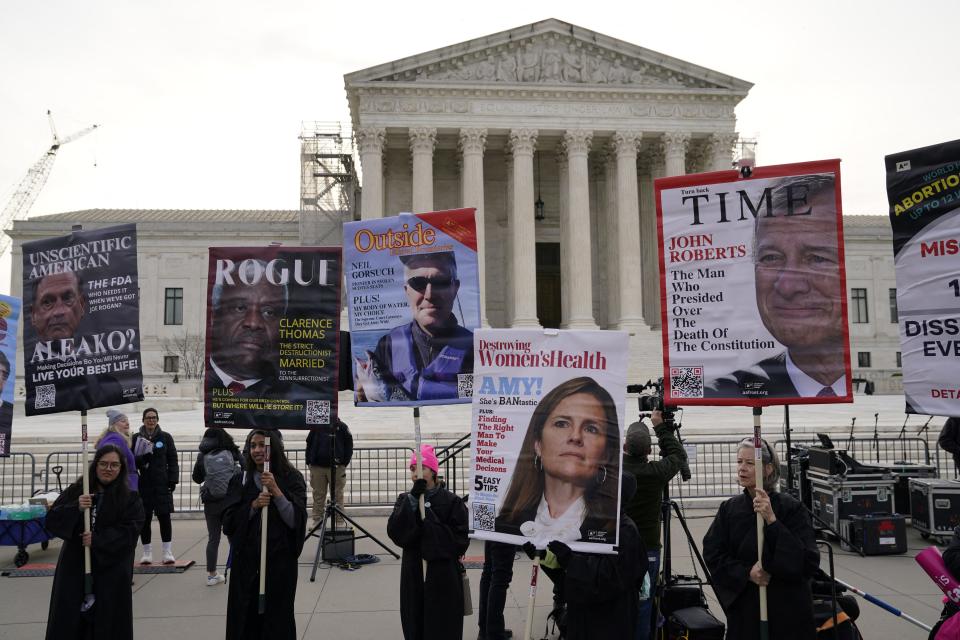
Crowds gather overnight outside the Supreme Court
As the sun set in Washington Monday evening, several hours before the Supreme Court will hear oral arguments on the mifepristone case, around 50 protestors and counter-protestors assembled out front.
While one anti-abortion group held a vigil and an attendee prayed into a microphone, abortion advocates chanted back "abortion is healthcare" into their own megaphones. Nearby, others held signs referencing the Comstock Act, the nineteenth century obscenity law at the center of many abortion opponents' arguments.
And around the corner, a line of near twenty people formed, with those camping out for a spot in the courtroom audience Tuesday.
-- Savannah Kuchar

'We are the pro-life generation and we will abolish abortion'
Abortion advocates and opponents faced off in front of the Supreme Court early Tuesday morning.
Mark Lee Dickson, a Texas pastor and leader of a local anti-abortion ordinance movement, stood trying to block photos of Aid Access members, an organization supporting the access of mifepristone by mail.Nearby, calls by one protestor that “Abortion is healthcare, abortion is essential,” went against chants by Students for Life members saying, “We are the pro-life generation, and we will abolish abortion.”— Savannah Kuchar
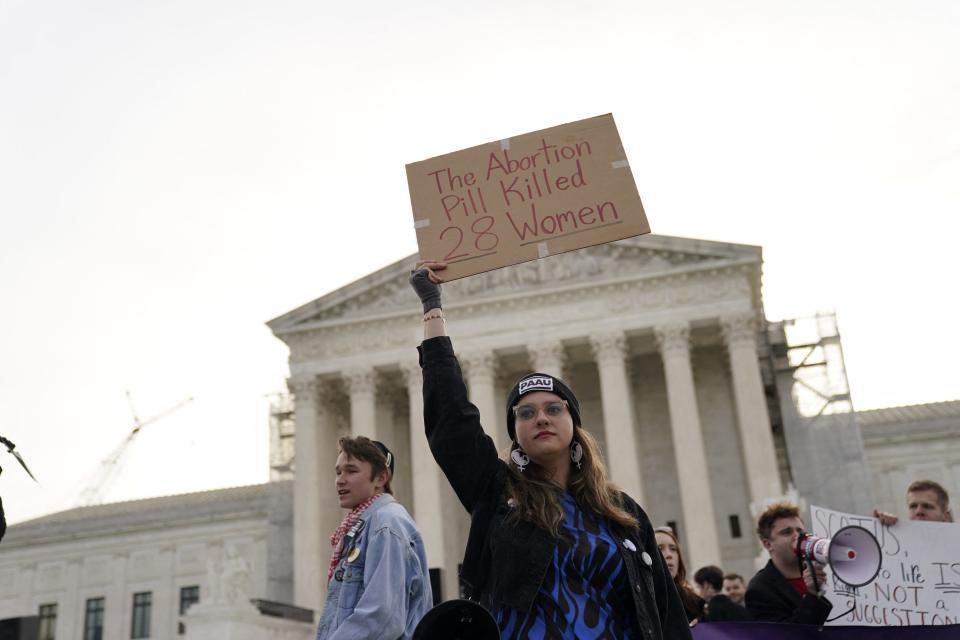
How common are medication abortions?
More than 6 in 10 abortions in the United States last year were completed with pills, according to the Guttmacher Institute, a research group that supports abortion rights.
That’s up from just over 5 in 10 abortions in 2020.
The FDA’s 2021 decision that mifepristone could be mailed directly to patients – one of the actions being challenged by abortion opponents − expanded access to medication abortion.
Access was further expanded in 2023 when the FDA set up a process for more pharmacies to dispense mifepristone.
Two of the nation’s largest retail pharmacies, CVS and Walgreens, announced this month they will carry the drug.
--Maureen Groppe
'Abolished from coast to coast' Anti-abortion movement looks to cities as target for bans
This article originally appeared on USA TODAY: Supreme Court live oral arguments over mifepristone abortion pill

